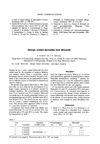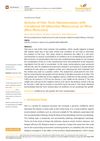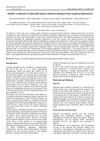 69 citations,
December 2011 in “Journal of Ethnopharmacology”
69 citations,
December 2011 in “Journal of Ethnopharmacology” Some Thai plants, especially Carthamus tinctorius, could help prevent hair loss and promote hair growth without adverse effects.
 46 citations,
January 2008 in “Journal of cosmetic dermatology”
46 citations,
January 2008 in “Journal of cosmetic dermatology” Caffeine and siloxanetriol alginate caffeine in emulsion form can reduce fatty cell size and number, potentially treating cellulite effectively.
 39 citations,
June 2017 in “Journal of Applied Research on Medicinal and Aromatic Plants”
39 citations,
June 2017 in “Journal of Applied Research on Medicinal and Aromatic Plants” Plant-based ingredients are effective and safe for modern skincare products.
 32 citations,
January 2008 in “Journal of Microencapsulation”
32 citations,
January 2008 in “Journal of Microencapsulation” Cosmetics with hinokitiol-loaded nanocapsules were found to effectively promote hair growth.
 27 citations,
August 2018 in “Therapeutic Delivery”
27 citations,
August 2018 in “Therapeutic Delivery” Nanotechnology could make hair loss treatments more effective and reduce side effects, but more research is needed before it's available.
 24 citations,
January 2003 in “Drug Delivery”
24 citations,
January 2003 in “Drug Delivery” Minoxidil-containing vesicles improve hair growth.
 23 citations,
January 2001 in “International journal of toxicology”
23 citations,
January 2001 in “International journal of toxicology” St. John's Wort extract and oil safety in cosmetics is unclear; more data needed on photosensitization, toxicity, and human irritation.
 16 citations,
March 2017 in “Journal of inclusion phenomena and macrocyclic chemistry”
16 citations,
March 2017 in “Journal of inclusion phenomena and macrocyclic chemistry” Minoxidil mixed with 2-hydroxypropyl-β-cyclodextrin in water can improve hair growth more than minoxidil alone.
 15 citations,
March 2013 in “Pharmaceutical nanotechnology”
15 citations,
March 2013 in “Pharmaceutical nanotechnology” Finasteride delivery through skin improved using invasomes and iontophoresis.
 15 citations,
November 2019 in “Cutaneous and Ocular Toxicology”
15 citations,
November 2019 in “Cutaneous and Ocular Toxicology” Minoxidil tretinoin liposomal based hydrogel shows promise for effective treatment of hair loss by delivering both drugs at the same time.
 13 citations,
January 2020 in “Nanoscale”
13 citations,
January 2020 in “Nanoscale” Finasteride and baicalin in phospholipid vesicles effectively promote hair growth and increase follicle count.
 13 citations,
January 1988 in “Contact Dermatitis”
13 citations,
January 1988 in “Contact Dermatitis” Some patients using Minoxidil for baldness developed allergic skin reactions.
 10 citations,
October 2009 in “Clinical Therapeutics”
10 citations,
October 2009 in “Clinical Therapeutics” Finasteride 5-mg oral disintegrating tablets and standard tablets are bioequivalent in healthy adult male Han Chinese volunteers.
 6 citations,
February 2023 in “Plant and Soil”
6 citations,
February 2023 in “Plant and Soil” Bacillus subtilis strain WM13-24 helps plant root growth through volatile compounds.
 4 citations,
May 2020 in “Dermatologic Therapy”
4 citations,
May 2020 in “Dermatologic Therapy” Redenyl lotion effectively promotes hair growth and improves quality of life for androgenetic alopecia patients.
 2 citations,
March 2019 in “European Journal of Dermatology”
2 citations,
March 2019 in “European Journal of Dermatology” Pharmacy-sold shampoos tend to have fewer allergens compared to those sold in other stores.
 2 citations,
January 2012 in “Hair therapy & transplantation”
2 citations,
January 2012 in “Hair therapy & transplantation” DDAIP-HCl significantly increases minoxidil absorption into the skin.
 1 citations,
November 2023 in “International Journal For Multidisciplinary Research”
1 citations,
November 2023 in “International Journal For Multidisciplinary Research” Herbal shampoos are safer and perform well, but need more research to improve quality.
 1 citations,
September 2022 in “KnE medicine”
1 citations,
September 2022 in “KnE medicine” Candlenut oil hair tonic helps mice grow hair, with higher oil concentration giving better results.
 1 citations,
January 2018 in “Acta dermatovenerologica Alpina, Pannonica et Adriatica (Tiskana izd.)”
1 citations,
January 2018 in “Acta dermatovenerologica Alpina, Pannonica et Adriatica (Tiskana izd.)” The herbal extract was found to effectively reduce and prevent hair loss without any side effects.
 1 citations,
January 2017 in “Social Science Research Network”
1 citations,
January 2017 in “Social Science Research Network” The document suggests creating a secure database for indigenous knowledge and recommends that the TKDL actively fight patents that slightly alter traditional knowledge.
 April 2023 in “Nigerian Journal of Clinical Practice”
April 2023 in “Nigerian Journal of Clinical Practice” Hair loss in adults is linked to heart disease risk factors like unhealthy blood fats, lack of exercise, and alcohol use. It's also slightly more common in people with metabolic syndrome. As people age, hair loss gets worse. In men, severe hair loss is tied to high blood pressure and a larger waist. In women, it's tied to higher body weight. People with hair loss should be checked for unhealthy blood fats and advised to avoid alcohol and inactivity.
 January 2020 in “Journal of Pharmacognosy and Phytochemistry”
January 2020 in “Journal of Pharmacognosy and Phytochemistry” The VCO-based herbal hair tonic is effective, safe for hair loss treatment, and can be mass-produced.
 December 2019 in “Drug Analytical Research”
December 2019 in “Drug Analytical Research” Magistral pharmacies had issues with production quality and dosage accuracy.
 March 2024 in “International journal of pharmaceutical sciences and drug research”
March 2024 in “International journal of pharmaceutical sciences and drug research” Androgenetic alopecia is influenced by various factors and can be treated with medications, procedures, and non-drug methods.
 February 2023 in “International Journal of Advanced Research in Science, Communication and Technology”
February 2023 in “International Journal of Advanced Research in Science, Communication and Technology” Herbal shampoos with Neem and Tulsi might be safer and more effective for controlling dandruff.

The hair masks are safe, stable, and effective for hair care.
 202 citations,
June 2005 in “Aaps Pharmscitech”
202 citations,
June 2005 in “Aaps Pharmscitech” Lecithin organogels could be good for applying drugs to the skin because they are stable, safe, and can improve drug absorption.
 193 citations,
January 2015 in “International journal of trichology”
193 citations,
January 2015 in “International journal of trichology” Dermatologists need to understand hair products to treat hair and scalp issues better.
 111 citations,
March 2012 in “Expert Opinion on Drug Delivery”
111 citations,
March 2012 in “Expert Opinion on Drug Delivery” Liposomes could improve how skin care products work but are costly and not very stable.






























